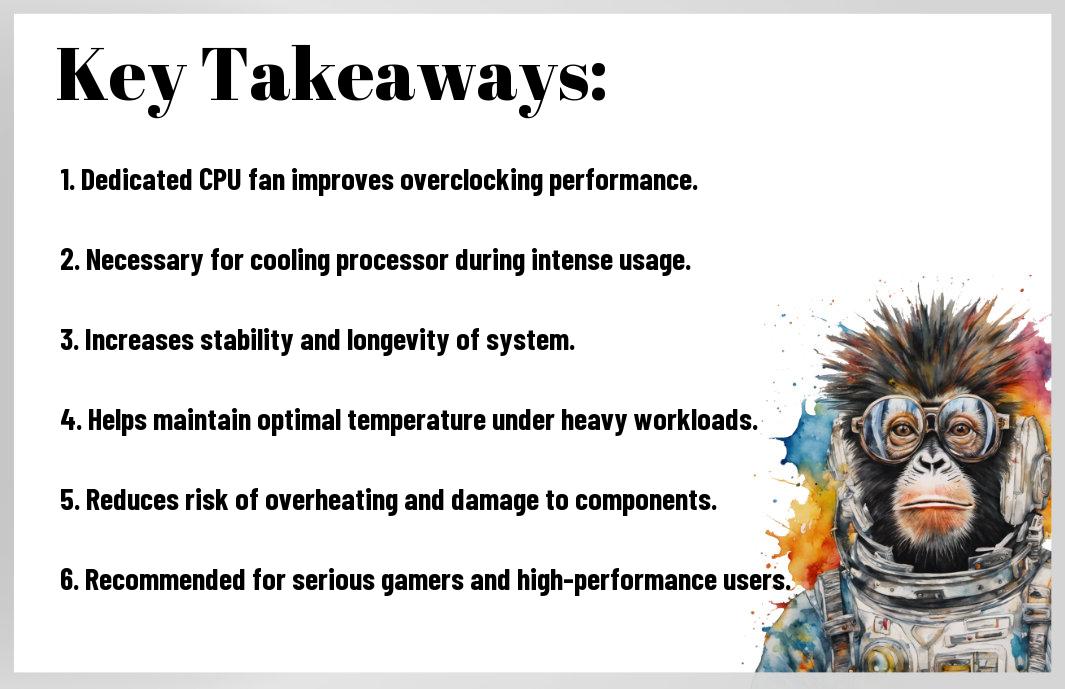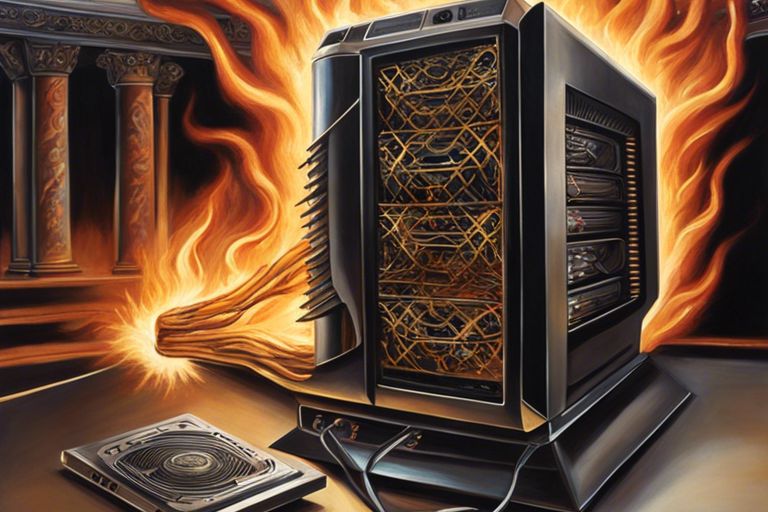With the rise of gaming and high-performance computing, many enthusiasts are turning to overclocking to squeeze out every bit of power from their hardware. One crucial component to consider is the CPU fan, as it plays a significant role in keeping your processor cool during the overclocking process. In this blog post, we’ll explore whether or not you really need a dedicated CPU fan for overclocking, the risks of not having one, and the benefits of investing in proper cooling solutions. Let’s dive in and get your hardware running at its full potential!
Key Takeaways:
- Proper cooling is crucial: Overclocking generates more heat, and a dedicated CPU fan can help maintain optimal temperatures.
- Performance boost: A dedicated CPU fan can enhance the performance of your computer when overclocking by keeping the temperature at a suitable level.
- Extended lifespan: Maintaining lower temperatures can contribute to a longer lifespan for your CPU, reducing the risk of overheating and damaging the components.
- Reduce noise levels: Dedicated CPU fans are designed to operate quietly, providing efficient cooling without creating unnecessary noise.
- Customization options: Dedicated CPU fans come in various sizes, designs, and features, allowing you to choose one that suits your overclocking needs and preferences.

The Heart of Your Machine: The CPU
How Your CPU Manages Heat Under Pressure
Even though your CPU is a tiny piece of silicon, it is the powerhouse that drives your entire system. As it processes data, it generates heat – lots of it. To prevent your CPU from melting under the pressure of intense computing tasks, it needs a cooling system to maintain optimal temperatures.
The Thermal Challenges of Overclocking
Pressure. When you overclock your CPU, you are vitally asking it to work harder and faster than it was designed to do. This leads to a significant increase in heat production, pushing your CPU to its thermal limits. Without proper cooling solutions, your CPU can overheat, causing permanent damage and potentially shortening its lifespan.
For instance, if you’re a gamer or a content creator looking to squeeze out every last drop of performance from your CPU, overclocking can provide a significant boost in speed and responsiveness. However, be aware that this additional performance comes at the cost of generating more heat, which can be a double-edged sword if not managed properly.
Fans, Liquid, and More: The Spectrum of Cooling Options
Air Cooling: Dedicated CPU Fans and Their Function
Now, let’s talk about air cooling, the OG of CPU cooling solutions. Dedicated CPU fans are like your system’s personal air conditioning unit. They work tirelessly to keep your processor cool during those intense gaming sessions or heavy workloads. These fans sit atop the CPU, whisking away heat and ensuring your system stays at optimal temperatures. They come in all shapes and sizes, with some sporting sleek designs and RGB lighting to add a touch of flair to your rig.
Beyond Air: Exploring Liquid Cooling Solutions for Overclockers
Liquid cooling takes your PC cooling game to the next level. Imagine a system where liquid circulates through tubes, drawing heat away from your CPU with remarkable efficiency. Liquid cooling solutions are popular among overclockers looking to push their systems to the limit without worrying about overheating. These setups often include a radiator, pump, and water blocks to create a closed-loop cooling system that can handle even the most demanding tasks.
Exploring liquid cooling solutions opens up a world of possibilities for enthusiasts who crave higher performance and better thermal management. While liquid cooling can offer superior cooling capabilities compared to air, it requires more maintenance and careful installation to prevent leaks, which could potentially damage your components. However, the benefits of lower temperatures and quieter operation make it a tempting choice for serious overclockers.
Matching Your Cooling to Your Overclocking Goals
Mild Overclocks: Can Stock Cooling Cut It?
Overclocking? It’s all the rage these days, pushing your CPU beyond its factory settings for that extra performance boost. But let’s talk about mild overclocks. Are you just dipping your toes into the world of overclocking, looking for a little more speed without going too crazy? If that’s the case, your stock CPU cooler might just do the trick. It’s designed to handle the heat your processor puts out during normal operation, and for a slight bump in performance, it should hold up just fine. Just keep an eye on those temperatures to make sure you’re not pushing it too hard.
Intense Overclocking: When to Invest in a Dedicated CPU Fan
Your overclocking ambitions are sky high, and you’re pushing your CPU to its limits. This is where things get serious. Intense overclocking generates a massive amount of heat, and your stock cooler might struggle to keep up. This is the time to invest in a dedicated CPU fan. A dedicated CPU fan can handle the extra heat generated by your overclocked processor, keeping temperatures in check and preventing potential damage to your hardware. When you’re pushing your CPU to its absolute maximum, a dedicated CPU fan is a must-have.
Stock coolers are great for everyday use, but they’re not equipped to handle the extreme temperatures that come with intense overclocking. With a dedicated CPU fan, you can ensure that your processor stays cool even under the most demanding conditions, allowing you to push your overclock to the limit without risking damage to your hardware. Don’t let overheating hold you back from achieving your overclocking goals – invest in a dedicated CPU fan and keep your system running smoothly.
Final Words
As a reminder, don’t underestimate the power of a dedicated CPU fan when it comes to overclocking. Ensuring your processor stays cool during intense gaming sessions or demanding tasks can make all the difference in performance and longevity. Investing in a high-quality CPU fan is like giving your rig a boost of adrenaline, allowing it to push past its limits and run at optimal levels. So if you’re serious about pushing your system to the max, a dedicated CPU fan is a must-have tool in your arsenal. Don’t settle for average when you can have exceptional performance with the right cooling solution.
FAQ
Q: Why is a dedicated CPU fan important for overclocking?
A: A dedicated CPU fan is crucial for overclocking because it helps dissipate heat more effectively, allowing your CPU to run at higher speeds without overheating.
Q: What are the benefits of overclocking your CPU?
A: Overclocking your CPU can lead to improved performance and speed, making tasks like gaming and video editing smoother and more efficient.
Q: Can you overclock your CPU without a dedicated CPU fan?
A: While it is technically possible to overclock your CPU without a dedicated fan, it is not recommended as it can lead to overheating and potential damage to your processor.
Q: How do I choose the right CPU fan for overclocking?
A: When opting for a CPU fan for overclocking, look for one with a high cooling capacity and low noise levels. Additionally, ensure it is compatible with your CPU socket.
Q: Are there any alternative cooling solutions for overclocking besides a dedicated CPU fan?
A: Yes, liquid cooling systems and advanced air cooling solutions are popular alternatives to dedicated CPU fans for overclocking, offering even better heat dissipation capabilities.



![Roblox Digital Gift Code for 2,200 Robux [Redeem Worldwide - Includes Exclusive Virtual Item] [Online Game Code]](https://m.media-amazon.com/images/I/51LrwIVIf7L._SY430_SX215_QL70_ML2_.jpg)
